
Norland was provided by Hooded Horse for review. Thank you!
This review used an LCD Steam Deck. OLED details will be coming later.
Norland may look like one of the many games following the line of Rimworld to get a chance of success, but it's one of the most unique games you'll find right now. With a heavy focus on diplomacy and management ahead of individual citizens, Norland bridges the gap between Rimworld and a full-on city-builder, and I'm here for it.
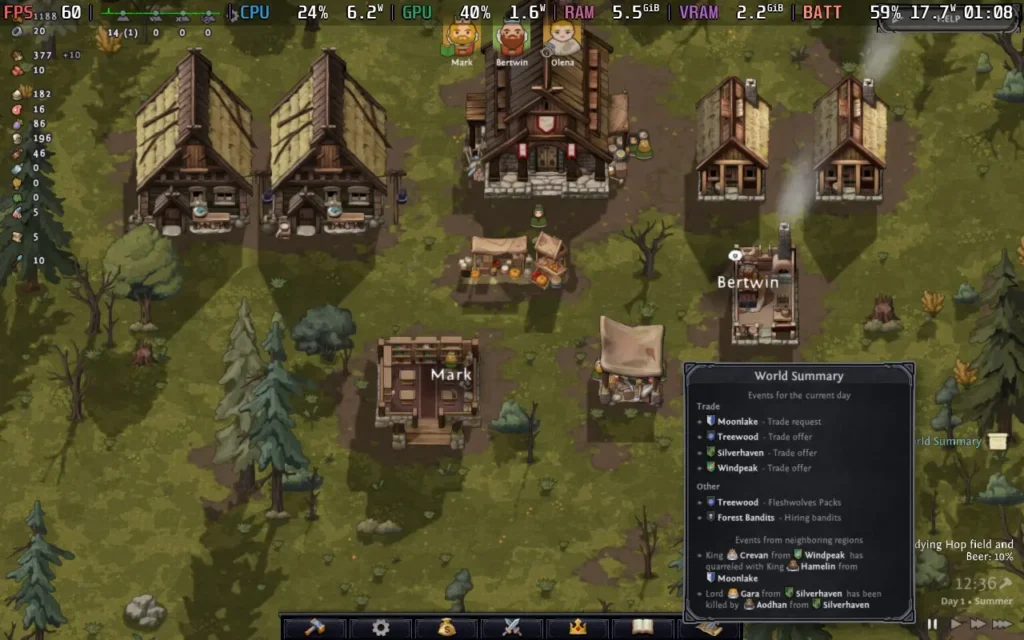
Norland puts you in the role of a King, overseeing his... well, kingdom. Unlike Rimworld, only certain individuals in the settlement, known as "Lords," are under your control. The general populace, whether peasants, slaves, or warriors, are not controlled directly by you but will follow the direction of your Lords. So, if you place a Lord in charge of a logging camp, they will direct peasants to work there.
This is one of Norland's many balancing acts it asks you to perform: choosing Lords who are skilled at management but not overworking them. Workplaces need to be given regular instruction, but there are only so many hours in the day, so you need to balance your Lord's workload so that they can get everything done. But even the Lords are somewhat semi-autonomous. If their mood is low or they have multiple tasks to complete, it's mostly up to them what order they choose to do their tasks or if they even do them.
There's always the worry in autonomous games like this that the AI won't behave how you want it to, or a glitch such as a peasant or Lord forgetting to eat/drink causes you to lose. While, at times, Norland's AI seems to prioritize the wrong things, leaving urgent matters unattended for a short while, it always rectifies itself in the end. I never lost or had a serious issue due to the AI not working properly. If I had food and alcohol, the characters would eventually eat, even if their hunger was at a dangerous level.
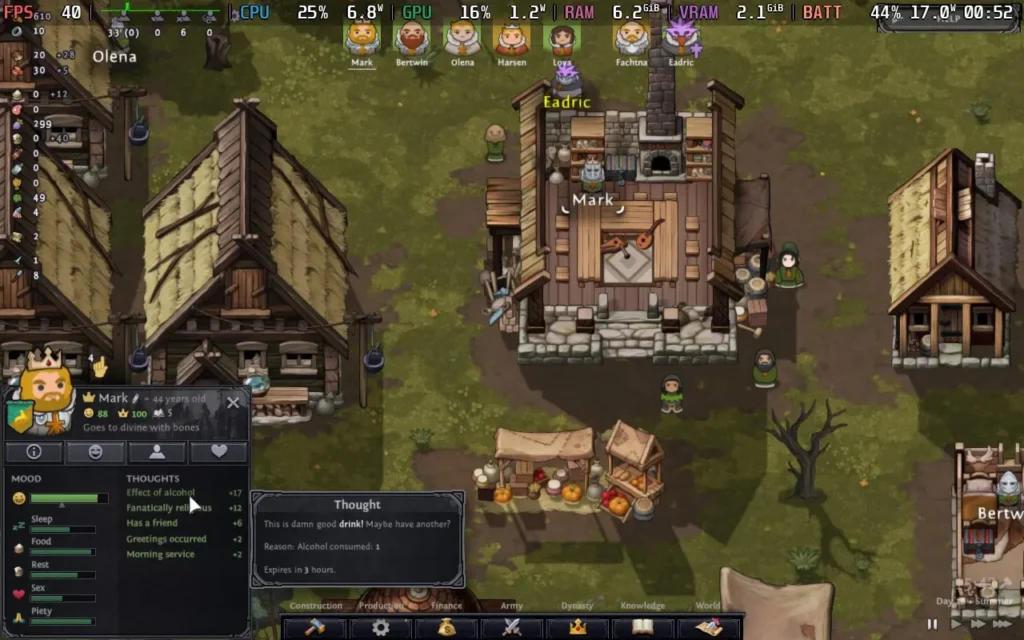
Progression is largely determined by the size of your population and the "knowledge" that your Lords acquire. Buying books from the trader who visits every couple of days will let you teach your Lords new building schematics. But if that Lord dies, any knowledge they had will be lost, so you won't be able to build that building anymore, so it's a good idea to teach a few Lords the schematics so you don't lose access to buildings. And of course, you'll need the workforce to man all these workplaces, so encouraging migrants from nearby villages to have enough housing and an appealing settlement is important too.
A lot of your time in Norland will be spent juggling your settlement's economy and your peasant's mood. Peasants want a variety of food and alcohol available to them. And they have to pay for their food and alcohol at the town's market using the wages you give them. This means it's on you to balance the cost of food and drink in your settlement and the worker's wages. You can pay them more so they can have everything they want if you can afford it. Or give them meager wages, just enough to live on, but you might risk a rebel uprising if their mood falls too far.
You also have to make sure your production chains are up to the task of feeding your population. Alcohol, for example, requires a hop farm, a brewery, and finally, a Tavern to distribute the ale. You'll need to make sure you're producing enough alcohol to satisfy your population, or else you'll have trouble on your hands. Your citizens have other needs, too, such as piety, requiring you to build a temple, hold sermons, and rest, so don't work your populace too hard. All the characters also have sexual needs, but that's mostly automated.
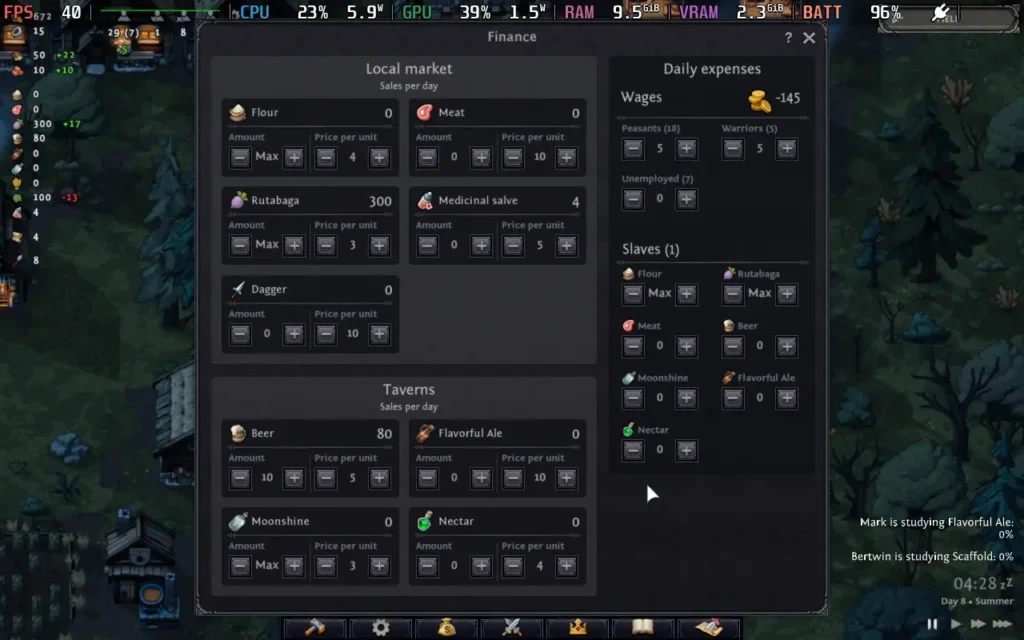
Besides internal troubles that may arise among your peasants, such as a religious uprising, slave uprising, peasant rebellion, peasants turning into criminals, assassinations, you know, the usual good stuff, you might also have to compete with challenges presented by your neighboring kingdoms.
If you have a weak army, neighboring kingdoms may demand that you pay gold to support the region's security, and they may even demand that you become their vassal, meaning you have to pay a tax to them every few days. Of course, the opposite is also true. If you are the strongest kingdom in the region, you can start demanding things from those around you. I mainly managed to stay afloat and ignored demands for tribute, instead, I checked on neighboring kingdoms and ensured my army was a similar size so I wouldn't be at risk of invasion.
Trade opportunities also occur regularly, with the chance to buy or sell goods to and from neighboring kingdoms to keep your peasants appeased or earn extra gold. Neighboring kingdoms may also send their Lords to visit your settlement, during which time you can make friends, or foes, with them, which may affect your kingdom's overall relationship with each other. Your Lords might even form a marriage alliance with another kingdom. Just be careful that they don't persuade your Lords to join them and leave you. Every Lord has a loyalty value, including other kingdom's Lords, so you can lose and gain Lords through Norland's loyalty system.
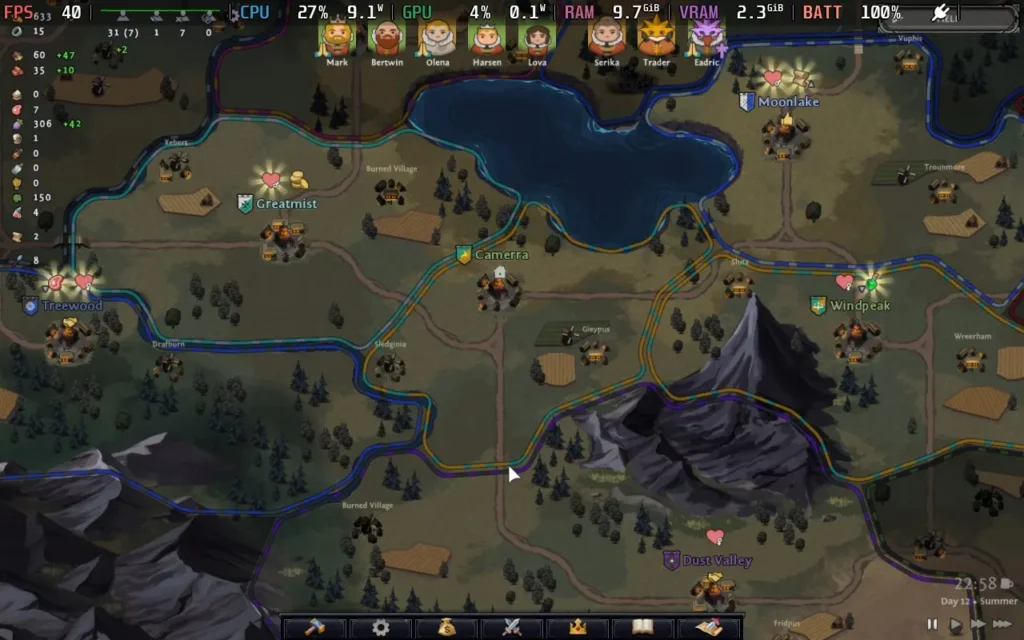
Norland doesn't hold back when it comes to its game world. While it has a somewhat cutesy presentation, the world in which the game takes place is brutal. Mothers and babies can die in childbirth, and criminals can be executed, enslaved, or just blinded to give them a lifelong debuff. Lords can pay to have sex with the peasants. And let's not forget the religious cult that's gradually destroying kingdom after kingdom, and it's heading in your direction, requiring you to build up an army before it reaches you.
The combat in the game is pretty basic, and like most other things, it's mostly autonomous. You can create an army of either peasants or mercenaries, equip them with weapons of your choice, assign one of your Lords to be the commander of the army, and then move them on the world map to other locations to initiate a battle, at this point, the AI mostly takes over, you can give rough directions as to which group the army should attack, but beyond that, they'll mostly fight themselves.
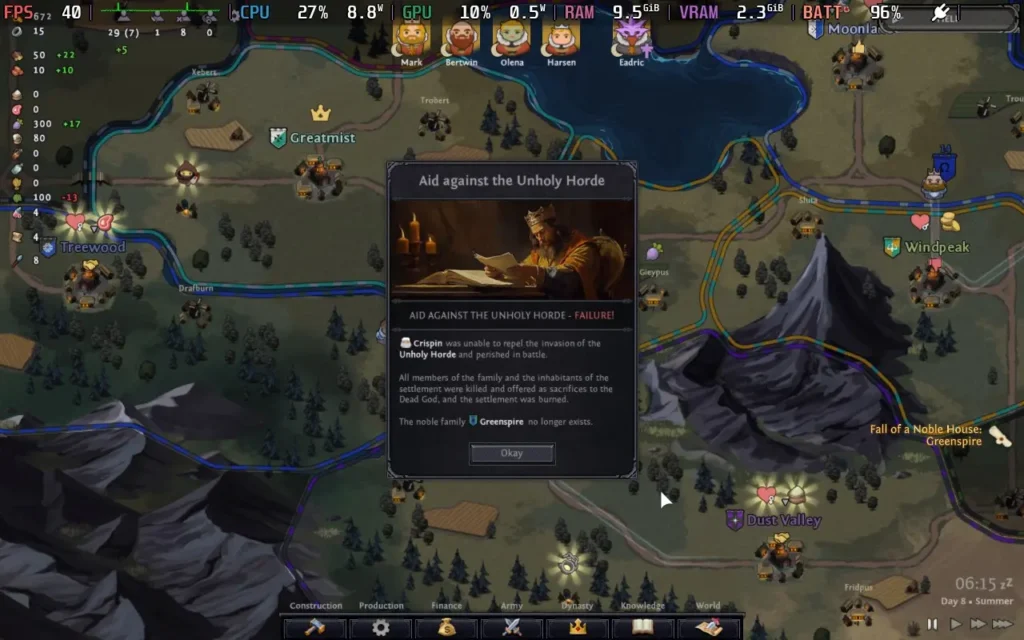
You only control 1 settlement. While you can gain authority over other kingdoms by making them your vassals, you don't take control of them directly; they will merely pay tribute to you regularly. The map of your 1 settlement isn't huge, but it can probably get as big as you would realistically want to manage, and it will take you many hours to reach the size of settlement possible in the game.
As I said at the start, Norland is a pretty unique game. It perhaps doesn't delve as deeply into the personal lives of your citizens as Rimworld does, but it adds the extra layers of a wider economy, political intrigue, and management. You are responsible for balancing all these things, ensuring unnecessary conflict doesn't erupt, managing wages and prices for goods, punishing peasants who break the law, and ensuring you have an heir to carry on your lineage when your Lords inevitably die. Fortunately, the AI systems in place seem to handle it all pretty well, and Norland is a pretty smooth simulation of a small medieval kingdom.
Norland supports 1280x800 as a resolution, so we do get full use of the Steam Deck's display, but as far as graphical options go, they're pretty much non-existent in Norland. Aside from the ability to toggle FXAA and VSync on and off, there are no other options you can change. The game has no gamepad support, so it does need to use a mouse/keyboard layout, but it works perfectly fine for this kind of game.
Because of that, I'm only offering 1 preset for Norland.
In your SteamOS settings, set an FPS Limit of 40 FPS / 40Hz and remove any TDP limit.
As we don't have many graphical settings to change, just set your FXAA to On and your VSync to Off.
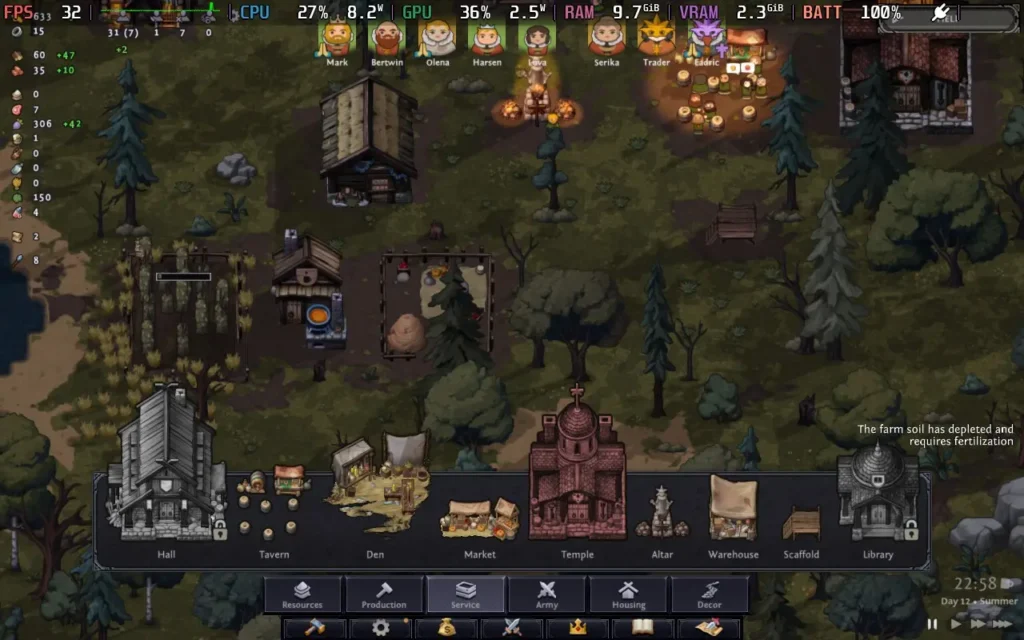
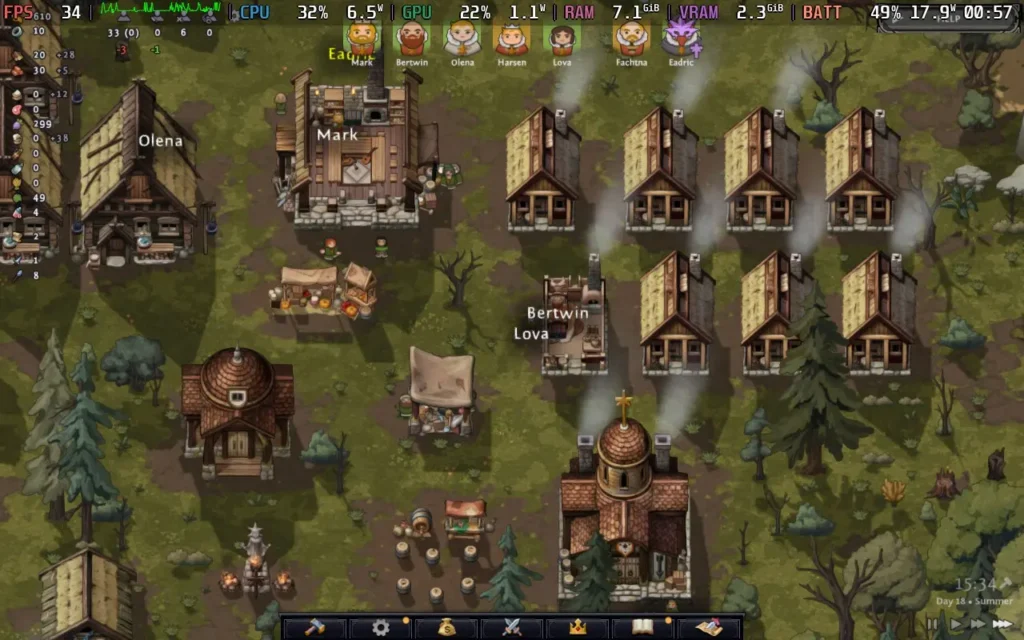
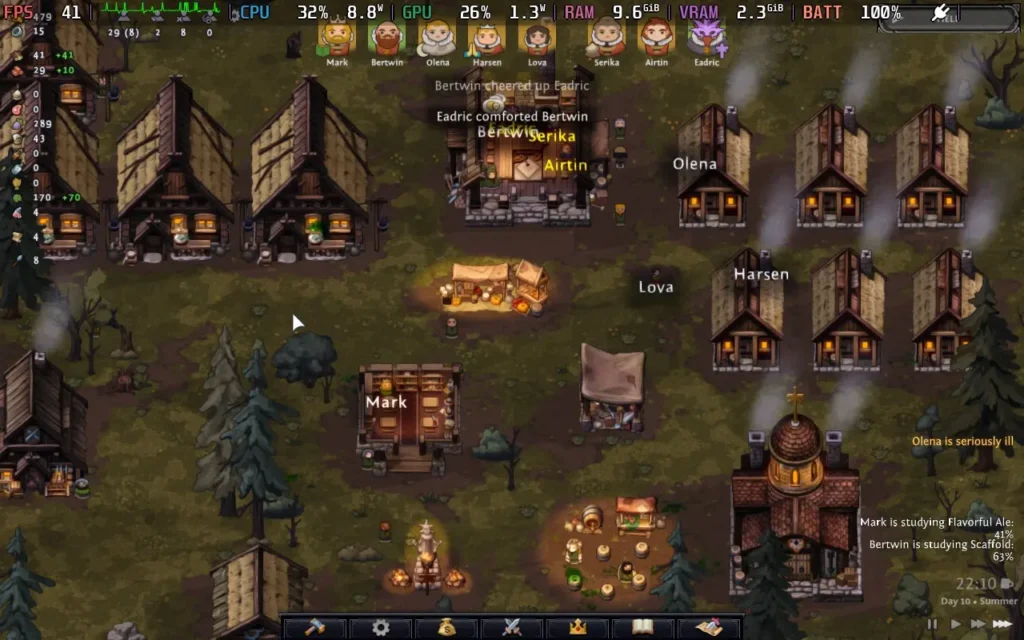
With the settings we've selected, you should mostly get 40 FPS, but Norland suffers from almost constant stutter, especially if you are fast-forwarding. It's a CPU-intensive game, and we can do nothing about that. But given the fairly slow-paced nature of the game, I found the stutters didn't cause major issues, and you can always pause to issue commands or assess a situation.
I also couldn't test up to the maximum colony size, as you can supposedly have more than 250 citizens and armies go against each other with over 200 units in total. My settlement peaked at around 50 citizens after about 10 hours of gameplay, which gave me the results above. However, if you do manage to reach that 250 number, you might need to lower the FPS limit to 30, as the number of citizens impacts performance. When I had 5 citizens, for example, the game can run at 60 FPS, but it can no longer do that with 50 citizens.
The power draw hovered around 16-18W, and it never really changed regardless of what you're doing, even when paused. So expect around 2 hours of battery life on a Steam Deck LCD and 2.5 hours on the Steam Deck OLED.
The GPU's temperature rarely exceeds 70C, but the CPU's will hover around 75-80C. There will be noticeable fan noise on the LCD Steam Deck.
Norland has no accessibility options. There is a UI Scale; however, it is locked to 80% on the Steam Deck. While some text is a little hard to see, it's still legible.
Norland manages to do exactly what it set out to do: create an intriguing and functional medieval kingdom manager. The AI systems in place do a good job of keeping everything flowing smoothly. The game is deep but not overwhelming to new players. Expanding your settlement and unlocking new buildings as you progress is satisfying and helps you feel like you're going places. The addition of managing diplomacy and the personal relationships of your Lords with each other and the Lords of neighboring kingdoms make Norland a game with plenty going on. I can vouch that minutes will easily become hours when you play this game.
As far as Norland's performance on Steam Deck goes, it's not perfect, but it's definitely in the realm of playability. The stutters are annoying, but in a slow-paced management game that can pause whenever, they will hardly cause issues when playing. The controls also work fine because of the ability to pause, even though there is no native gamepad support. I couldn't test the game to its absolute limit, as it would take tens of hours to reach that point, but from what I was able to test, the Steam Deck should be fine.
Our review is based on the PC version of this game.
If you enjoyed this review, be sure to check out the rest of the content on SteamDeckHQ! We have a wide variety of game reviews and news that are sure to help your gaming experience. Whether you're looking for news, tips and tutorials, game settings and reviews, or just want to stay up-to-date on the latest trends, we've got your back.
Norland is perfectly playable on the Steam Deck, but frequent stutters can become a bit annoying. The controls are surprisingly easy to manage, with the option to pause at any point if you need thinking time.